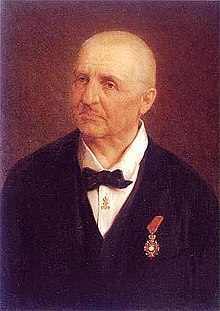| Symphony No. 6 | |
|---|---|
| by Anton Bruckner | |
 A portrait of Anton Bruckner | |
| Key | A major |
| Catalogue | WAB 106 |
| Composed | 1879 – 1881: |
| Dedication | Anton von Oelzelt-Newein and his wife Amy |
| Published |
|
| Recorded | 1950 Henry Swoboda, Vienna Symphony |
| Movements | 4 |
| Premiere | |
| Date | 26 February 1899 |
| Location | Graz |
| Conductor | Gustav Mahler |
| Performers | Vienna Philharmonic |
The Symphony No. 6 in A major, WAB 106, by Austrian composer Anton Bruckner (1824–1896) is a work in four movements composed between 24 September 1879, and 3 September 1881[1] and dedicated to his landlord, Anton van Ölzelt-Newin.[2] Only two movements from it were performed in public in the composer's lifetime.[3] Though it possesses many characteristic features of a Bruckner symphony, it differs the most from the rest of his symphonic repertory.[4] Redlich went so far as to cite the lack of hallmarks of Bruckner's symphonic compositional style in the Sixth Symphony for the somewhat bewildered reaction of supporters and critics alike.[5]
According to Robert Simpson, though not commonly performed and often thought of as the ugly duckling of Bruckner's symphonic body of work, the symphony nonetheless makes an immediate impression of rich and individual expressiveness: "Its themes are exceptionally beautiful, its harmony has moments of both boldness and subtlety, its instrumentation is the most imaginative he had yet achieved, and it possesses a mastery of classical form that might even have impressed Brahms."[6]
- ^ Simpson (1967), p. 124
- ^ Redlich (1963), p. 102.
- ^ Korstvedt (2001), p. 185.
- ^ Wolff (1942), pp. 217–218.
- ^ Redlich (1963), p. 95.
- ^ Simpson (1967), p. 150